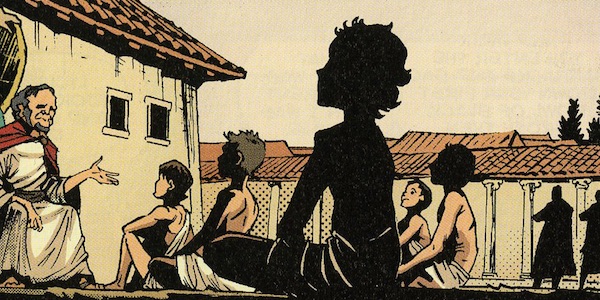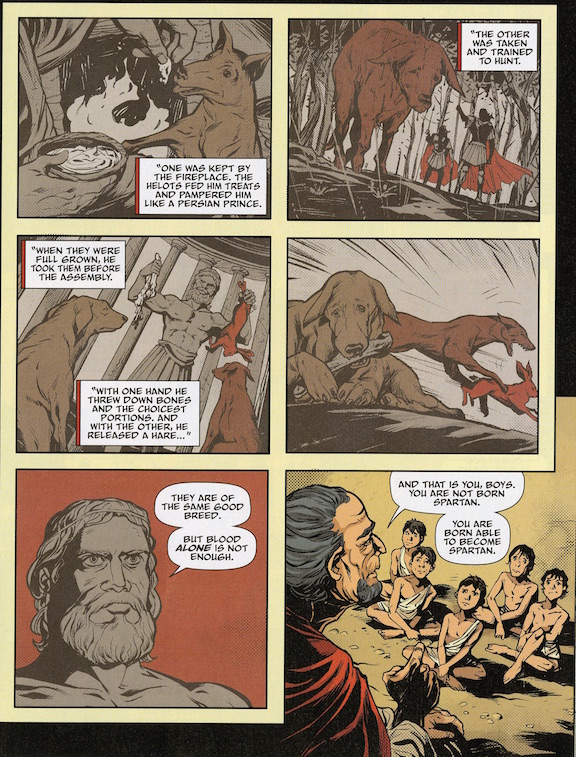
September 17, 2020, by Lynn Fotheringham
Lycurgus’ dogs, part 1
CONTENT: REFERENCE TO ANCIENT SLAVERY, IMAGES OF HUNTING WITH DOGS (IN ANCIENT GREECE)
In this post, I move on to chapter/issue 2 of Three, by Kieron Gillen & Ryan Kelly, still focusing on comparisons between the comic and the ancient source-material it builds on. There’s an introduction to Three in this post on my blog, and an overview of the chapter on the Departmental blog.
On p.12 of this issue we see Sparta itself for the first time; a splash-page (i.e. a single image) sets the scene, with only these words on it, at the top:

THREE ch.2, p.12 top
Caption-boxes usually contain the words of an omniscient narrator, but the quotation-marks inside these boxes indicate that the words are spoken by a character; compare Terpander’s stories of Plataea and Stenyklaros. The red stripe at the edge of the caption-box further serves to draw attention to the fact that this isn’t the ‘usual’ caption-box. After the ‘prologue’, in fact, the omniscient narrator only ever speaks to identify a character or a place – and only speaks in big block capitals as in ‘Sparta’ here.
At the top of the next page, we see the person speaking:

THREE ch.2, p.13 panel 1
An oldish man (grey hair, long tunic) is talking to a group of boys sitting on the ground, with two silhouetted figures visible in the background. The next five panels are marked out from their surroundings by a shift in visual style (reduced colour palette, panels of exactly even size, unifying frame/gutter) which echoes Terpander’s earlier narratives: it is clear that what we have here is one character telling a story to an audience about ‘Lycurgus the lawgiver’ – and two dogs:

THREE ch.2, p.13 panels 2-7
This story appears twice the corpus of the first/second-century C.E. writer Plutarch, including in the Sayings of the Spartans collection (see the post on anger for more info).
Λυκοῦργος ὁ νομοθέτης βουλόμενος ἐκ τῆς προϋπαρχούσης διαίτης τοὺς πολίτας εἰς σωφρονεστέραν βίου τάξιν μετάγειν καὶ καλοκαγαθικοὺς ἀπεργάζεσθαι (ἁβροδίαιτοι γὰρ ἦσαν) δύο σκύλακας ἀνέθρεψε ταὐτοῦ πατρὸς καὶ μητρὸς γενομένους· καὶ τὸν μὲν εἴθισε περὶ λιχνείας οἴκοι ἐάσας· τὸν δὲ ἐπαγόμενος ἤσκησε περὶ κυνηγέσια. ἔπειτα ἀγαγὼν εἰς τὴν ἐκκλησίαν ἔθηκεν ἀκάνθας καὶ λιχνείας τινάς, ἀφῆκε δὲ καὶ λαγών· ἑκατέρου δ᾿ ἐπὶ τὰ συνήθη ὁρμήσαντος καὶ θατέρου τὸν λαγὼν χειρωσαμένου, εἶπεν, “ὁρᾶτε, ὦ πολῖται, ὅτι ταὐτοῦ 226γένους ὑπάρχοντες ἐν τῇ τοῦ βίου ἀγωγῇ παρὰ πολὺ ἀλλήλων διάφοροι ἀπέβησαν, καὶ ποιητικωτέρα τῆς φύσεως ἡ ἄσκησις πρὸς τὰ καλὰ τυγχάνει;” (Sayings of the Spartans, Lycurgus 1 = Moralia 225f-226a) |
Lycurgus, the lawgiver, wishing to recall the citizens from the mode of living then existent, and to lead them to a more sober and temperate order of life, and to render them good and honourable men (for they were living a soft life), reared two puppies of the same litter; and one he accustomed to dainty food, and allowed it to stay in the house; the other he took afield and trained in hunting. Later he brought them into the public assembly and put down some bones and dainty food and let loose a hare. Each of the dogs made for that to which it was accustomed, and, when the one of them had overpowered the hare, he said, “You see, fellow-citizens, that these dogs belong to the same stock, but by virtue of the discipline to which they have been subjected they have turned out utterly different from each other, and you also see that training is more effective than Nature for good.” |
- Text and translation by Frank Cole Babbitt, Loeb Classical Library vol.245, 1931.
You can see from this how closely Three follows the ancient source. But this is not the end of the story, either in Three or in Sayings of the Spartans; there’s a twist. Find out what it is in the next post!
NOTE: I may refer to/quote comments on this post either in later blog-posts or in a research publication. More information about my audience-research, including a Privacy Notice and ways of getting hold of the book.
Extracts from Three © 2013 Kieron Gillen & Ryan Kelly. Used with permission.
No comments yet, fill out a comment to be the first

Leave a Reply